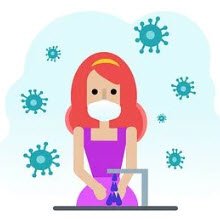Masks are a key element to staying healthy, and not only from viruses. If you jog or ride a bike in a populated area, you can filter out unhealthy viruses, dust, pollens and chemical pollution by wearing a mask. In a virus pandemic, you should wear a mask every time you leave the house.
Masks are not just for virus pandemics or normal flu season. It is clinically proven that wearing masks is effective in reducing not just “viral load,” but also filtering out air pollutants from cars and pollens. This NIH study shows that even a few layers of cotton handkerchief blocks 25% of airborne pollutants. A Cambridge study that reveals there is approximately a 70% reduction in virus transmission achieved by a few layers of cotton-polyester blend shirt fabric turned into a mask.
Web Info Life gets commissions for purchases made through links in this post.
Whether it is a normal flu season or a full scale pandemic, you and your family should wear masks when you leave the house, especially if any of you are vulnerable to health issues.
Cloth masks are readily available online in medical, casual and dressy styles. Making masks for your family and friends is fun and allows you to customize for outfits. We’ve provided info here on how to make DIY masks.
Washing Your Hands As Important As Mask Wearing
Masks can stop a virus and more from spreading, but they are not magic. How well a mask protects you depends on how disciplined you are on your handwashing and mask-handling habits. You cannot touch your face to adjust your mask frequently. You cannot wear a mask that is soiled. If you wear a mask with thin fabric or loose weave, droplets from a cough or sneeze can get through.
This cannot be overstated: soap and water really work! Just because a virus is called “a respiratory virus” that doesn’t mean it can only enter your body through breathing. A virus can infect you if your contaminated hands touch any of your mucus membranes such as eyes, nose or mouth. This means: the best way to protect yourself from catching any virus is to regularly wash your hands with soap and water.
Wash Your Hands Often to Stay Healthy

Wash with soap and water before and after:
- Preparing and eating food
- Caring for someone who is vomiting or has diarrhea
- Treating a cut or wound
- After blowing your nose, coughing, or sneezing
The CDC has information on changing an infant’s diapers or cleaning up a child who has used the toilet
Same Practices for Good Health During Flu Season or Pandemic:
- Keep up the “social distancing,” like limiting attendance at non-urgent events
- Work from home if your employer will allow it
- Stay home if you feel ill
- Take your temperature daily. If you develop a fever, self-isolate and call your doctor
- It is extremely important to wash hands regularly
- Avoid touching your eyes, nose, and mouth with unwashed hands
- Cover all coughs and sneezes in your elbow or with a tissue
- Disinfect frequently-touched surfaces, such as doorknobs, refrigerator handle, mobile phones
